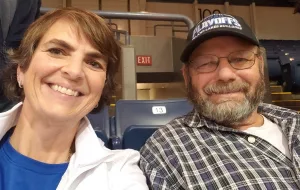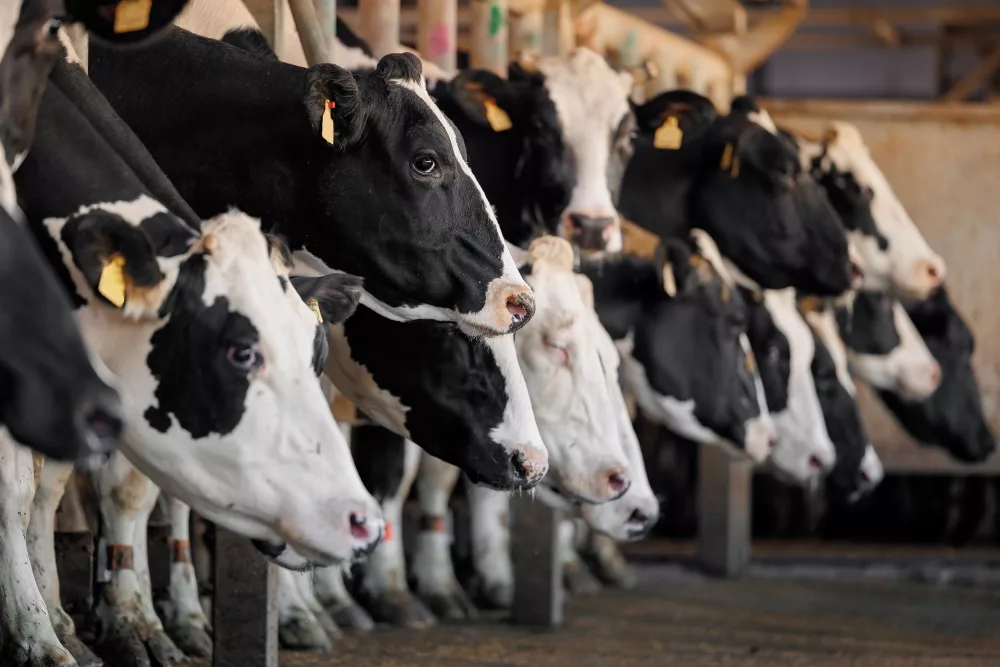Cheboygan County farmer Jim LaPeer’s dream was raising cattle.
“Bought the first 50 acres in 1981, built it and built it, and what we ended up with is a purebred Black Angus farm. We were selling breeding stock, bulls in particular, to other producers.”

And then, after 40 years of building the herd, Jim’s dream crashed down. One of his cows contracted tuberculosis (TB).
“So we got quarantined for 17 months, couldn’t sell anything, couldn’t bring anything in. In the meantime, you’re having calves, they’re running out of feed. It got to be very, very stressful.”
State officials bought many of the animals, but the prices were lower than a purebred herd was worth.
“We couldn’t afford to feed them all. So I had these cows that, again, purebred herd with genetics long as your arm. So, they offered to take them, but they took them at salvage value. I had cows that I purchased for better than $3,000. The state—well, they offered 1,100. And in the end, after battling, we got 1,600 a piece.”
Jim was able to keep some young animals, but his herd numbers were cut drastically. During the most recent calving season, he only had seven calves. Usually, he had more than 20.
His customers were also affected, as their herds were quarantined and animals were destroyed, including bulls right before breeding season.
His wife, Kelly, saw all of this take a toll on Jim.
“It was just watching what it was doing to him. He had terrible health issues. He was very anxious, he got depressed. He wasn’t sleeping. Then, he went on medication, then all he would do is sleep and I just watched it tear him apart.”
In addition to that stress, Kelly taught at the local school—in the middle of the pandemic.
“I’d give him a kiss in the morning when I’d go out the door and make him promise me that he was not going to do anything until I got home. And that was terrifying and horrific. And then you go to school and you’re worried about, what am I going to catch? We weren’t able to visit our grandkids for a significant period of time and that was–that didn’t help at all.”
“We just really, really, really felt alone,” Jim said. “And we found out that we weren’t necessarily, that it wasn’t necessarily the truth.”
Help came from Jim and Kelly’s field veterinarian, who noticed that the couple weren’t feeling well. He got in touch with a specialist at Michigan State University who then connected the LaPeers with Pine Rest Christian Mental Health Services.
A counselor with Pine Rest began working with Jim and Kelly through teletherapy, which meant they could sit in their living room for sessions with their counselor, who was two hours away.
“He hit it right away,” Kelly said. “He said, ‘Hey, you’re allowed to feel like this. This is grief. You know, you’re grieving the end of this dream. And it’s okay. You’re gonna get through it, and there’s a process and there’s steps.’”
It took some time for Jim to become used to the process, but he found that the sessions were very helpful.
“Yeah, very apprehensive, I’d never been one–we’re a very rural area. Counseling services aren’t readily available in Cheboygan County, at least not easily. Once Dr. Agee started talking, we find out that we can just sit on our coach and aim the computer at us from our coffee table and go through our sessions. My impressions of the process changed dramatically for the better.”
Jim said that he, Kelly, and the counselor would chat about things that were bothering them and that the process worked well.
“For me, it’s basically just talking about things and not internalizing. I’ve always considered myself fairly strong and can handle the situations, no matter how stressful. Obviously, that one was a little bit—not a little bit, quite a bit more than I could actually control myself.”
Kelly appreciated being able to sit in their living room to attend the counseling sessions.
“We didn’t waste time driving. We didn’t have to wait if he was late, or you know, because he was doing most of his counseling sessions remotely, as well. And I think that makes a huge difference. I don’t think people necessarily knew that they could do things that way.”
Through these conversations, the counselor challenged them to consider how they can help farmers in similar situations. Jim and Kelly had been financially responsible for the cattle during the first twelve months of the quarantine when no animals could be sold or bought, and they became determined to help other farmers in similar situations.
Jim became involved with local agricultural organizations and met with state legislators.
“He met with some legislators and he made them realize kind of the things we were going through and financially what we were going through and the lack of feed. And so now, there has been legislation passed that there is money available, that if you’re quarantined that they will reimburse you so much per animal per day. That all came about because of the initiative, that Jim put in the time and the effort and the leg work, and he got other people to listen. Those were some of the things that Dr. Agee had told him, he’s like, ‘Okay, how can you make this better?’ and so he started–those were the things he would work on during the day. How can I make this better for the next person that comes along?”
After Jim talked with legislators, the Bovine TB Producer Reimbursement appropriated $400,000 in funding for assisting producers with “feed, bedding, veterinary care, and electronic monitoring devices.” The LaPeers were given assistance in the last five months of their quarantine.
Kelly said they wanted to make sure that other people knew what could happen.
“They would tell you things like yeah, other people have went broke. Other families have divorced and broke up and all these things can happen and you know, that’s not where we were and not where we wanted to go and we kind of decided we were going to get through this and we were going to get through it together.
“We were Herd 81. The process makes you feel like you are in it alone. Nobody else is allowed to know who Herd 80 is or who Herd 79 is. I think if there was more of a support group, that would help a ton. We could tell them, don’t do this. Make sure you do this. You know that there’s counseling out there that there’s help available that you’ve got to reach out for but just because of the way it’s set up, you’re so isolated that it really is a terribly lonely feeling.”
Jim encourages other farmers who are going through stressful times to use the resources around them to find help.
“Take advantage. Look for help. Reach out.”
“They are never going to get rid of TB,” Kelly said. “So now they’re figuring out how to live with it. So, unfortunately, there’ll be a herd 83 and 84.”
“It’ll go on and on,” Jim added.
“So, hopefully, what we’ve been through and how we’ve at least made some of these people see what it does to a farm and a family, it’ll change something.”
For more information on teletherapy, contact Remington Rice with MSU Extension or learn more at the MSU Extension teletherapy website.





